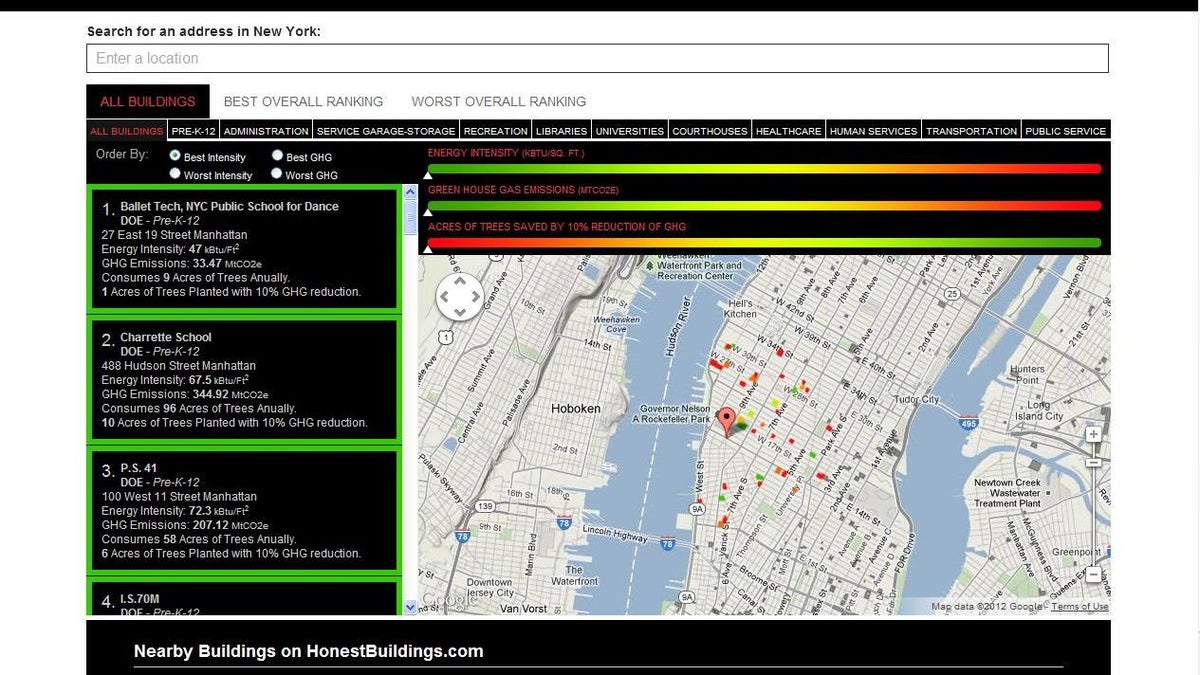Cleanweb hackers get busy with energy data
A weekend hackathon generates Web and mobile apps geared at improving energy and resource efficiency with a heavy dose of social.

Armed with little more than data sets, APIs, pizza, and beer, a group of software developers this weekend set out to demonstrate the power of information technology to help the environment.
The Cleanweb Hackathon attracted about 100 developers in New York City as well as a panel of judges that included New York City's chief digital officer and the U.S. chief technology officer. The first hackathon took place last September in San Francisco.
Yesterday afternoon, 15 teams, including one from Columbia University, showed off their "hacks" and received awards. The Web and mobile applications touched on everything from streamlining the solar business model to identifying municipal buildings in New York that most badly need an energy efficiency upgrade. (Answer: Metropolitan Museum of Art.)
The idea behind the Cleanweb is to use existing information technologies to accelerate clean technologies and resource-efficient business models, said venture capitalist Sunil Paul, who is helping popularize the term. Airbnb, which lets people rent out their homes, is a good example of a service that people enjoy and is generally good for the environment since fewer resources are used.
"I believe we are on the cusp of this new golden age and part of this new golden age will be built on this idea of the clean Web," he said yesterday before hackathon teams demoed their applications. "It's like this little kernel that grows into big opportunities."
The overall winner, as determined both by the judges and other participants, was an application called Econofy that helps online shoppers find the most efficient appliances. The Web app pulls data from EnergyStar ratings and popular products on Amazon to show consumers how much they would save by purchasing a more efficient model and the purchase price. In the process, the developers hope to create more competition among manufacturers to make efficient air conditioners, refrigerators, televisions, and the like.
Another prize winner was NycBldgs.com, which used energy usage data provided by New York City to create a map of the municipal buildings and how they rank on energy usage and greenhouse gas emissions. The app is designed to zero in on buildings that could improve their efficiency and, conversely, identify buildings, such as schools, that perform well.
A number of applications sought to create competition among individuals to motivate people to lower their personal energy use through gaming or sharing their information.
The data sets and APIs came from a number of sources, such as the Energy Information Administration and smart grid company Tendril, which has a platform for collecting data from connected devices in a home, such as a smart meter or gateway, and generating recommendations for efficiency.
A potential data standard is the Green Button, which provides an individual's electricity use in one-hour increments for a year. Three utilities last week showed off some applications that use the data, such as letting consumers decide on different time-of-use utility rates or evaluating solar. Consumers can download this data in machine-readable format, said U.S. Chief Technology Officer Aneesh Chopra, who was on hand for the presentation of demos that were written over the weekend.
"The apps demonstrated today all have the potential to scale," he said.

